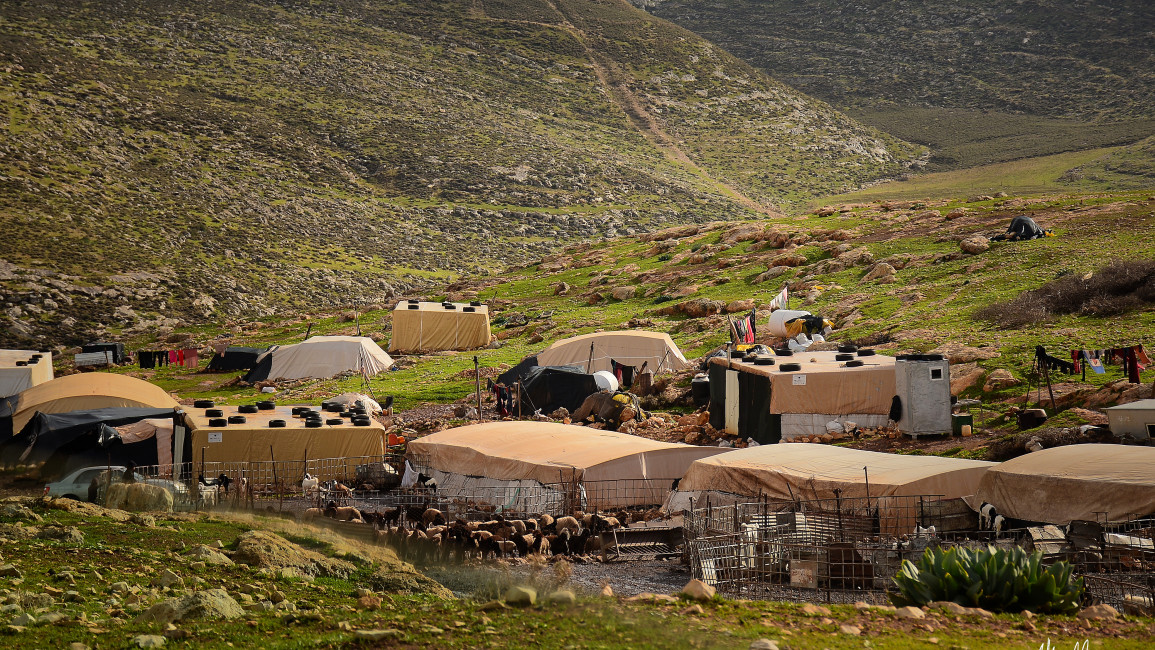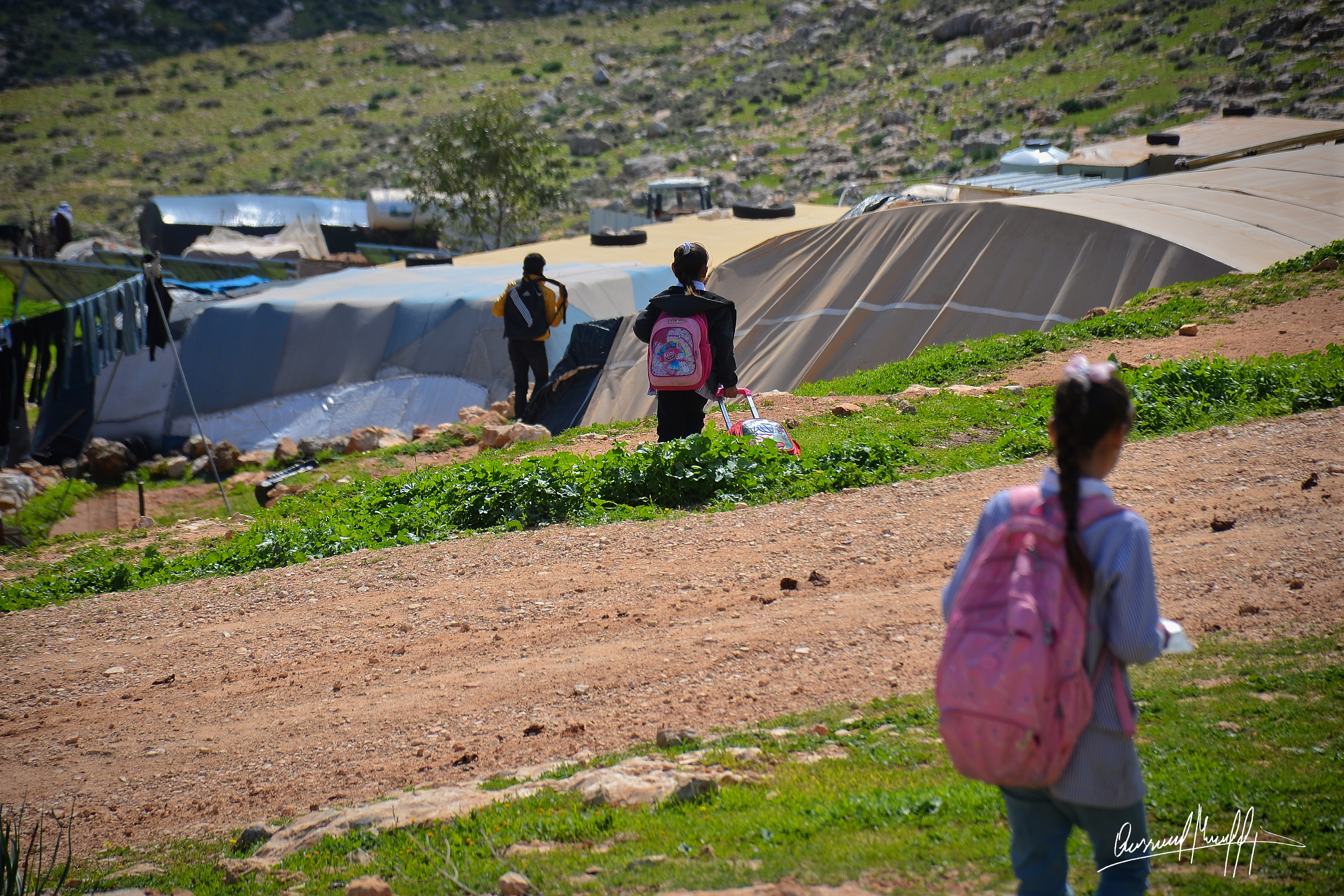Israeli settlers want to 'intimidate' foreign diplomats from visiting West Bank's Area C
Israeli settlers are trying to intimidate international diplomats away from visiting Palestinian communities in the occupied West Bank's 'Area C', a source in an international NGO working in the occupied West Bank, who asked not to be named, told The New Arab on Monday, 25 September.
The remarks came after a group of Israeli settlers attacked a European diplomatic delegation visiting a Bedouin community east of Ramallah last Thursday.
The delegation was visiting the Wadi Al-Siq Palestinian Bedouin community south of the town of Taybeh, east of Ramallah, overlooking the Jordan Valley in 'Area C', which is under direct Israeli military control.
The visit was organised by the West Bank Protection Consortium, a group of international NGOs assisting Palestinian communities in 'Area C'. Israeli settlers belonging to the far-right Israeli youth organisation Im Tirtzu' stormed the Bedouin village and interrupted the briefing offered to the diplomats.
פעילי ימין חמושים הפריעו לסיור דיפלומטים שארגן בצלם, אחד נופף באקדח בשטח B. המשטרה הפלסטינית עצרה אותם. pic.twitter.com/1lAGKt2zgL
— B'Tselem בצלם بتسيلم (@btselem) September 20, 2023
According to WBPC reports to TNA, the Israeli settlers stormed where the briefing was being held and began to chant slogans with megaphones, harassing the delegation. The visit was interrupted, and the delegation left the Bedouin community to the neighbouring town of Taybeh.
Eyewitness residents of Taybeh told TNA that at least four Israeli settlers followed the diplomats into Taybeh, where they were stopped by Palestinian security forces, who arrested the settlers and later handed them over to Israeli troops.
"Palestinian security members stopped the convoy of cars and ordered the settlers to step out, and one of them resisted, even pulling out a pistol", a resident of Taybeh who asked not to be named told TNA.
"The Palestinian officers fired several shots in the air and arrested the settlers," the resident added. "Settlers sometimes come to Taybeh and buy from stores, but this is the first time that settlers drive so deep into the town to attack or harass someone, let alone pull out a firearm."
The Wadi Al-Siq Bedouin community is located on lands belonging to the towns of Taybeh, Rammun and Deir Dibwan. Israeli settlers established an illegal outpost in the valley in 2020 and began to harass the community.
[Qassam Muaddi/TNA]
The settler outpost was established by a group of Israelis, who illegally built the Kochav Hashachar settlement to the east of Taybeh, led by a settler who began herding sheep on lands owned by Palestinians from Taybeh that Bedouin families used in agreement with owners for decades, the international NGO source explained to TNA.
"This particular settler was born and raised in an illegal Israeli settlement in the Gaza Strip and moved to Kochav Hashachar after the Israeli disengagement plan in 2005 when Israel pulled evacuated settlements in the Gaza Strip", the source said.
"Since 2020, the settler group has been harassing Bedouins in the area, forcing 18 out of the 19 Bedouin communities who have been living there for decades to move closer to the immediate surroundings of Taybeh, where they can only herd in agricultural cropland of villagers, which has raised tensions between them and the Bedouin families", they noted.
"The settler group now effectively controls some 6000 dunams (600 acres) of land belonging to families from Taybeh, which represents up to 25% of all the land belonging to the town", they added.
According to the source, Israeli settlers "regularly attack Palestinian villages and communities, shortly after an international diplomatias a way to intimidate foreign diplomats from visiting these communities".
"This is a rare case of direct harassment of a delegation, as Israeli settlers not only interrupted the visit but followed them for more than five kilometres, putting them in a dangerous situation, which is an escalation of intimidation attempts".
The area in question is located on the eastern slopes of the West Bank's central hills, on the edge of the Jordan Valley. According to experts, the area is strategically crucial for Israeli settlement plans.
"The Israeli government sees the eastern hills area in the West Bank as a strategic zone for settlement expansion to isolate the Jordan Valley from the rest of the West Bank", Khalila Tfakji, a senior Palestinian expert on Israeli settlements, told TNA.
"Herder settlers are one of the tactics employed for this aim, funded and supported by the Israeli government and protected by the Israeli army, they can control a maximum of land with a minimum of resources, people and time, terrorising Palestinians out of the area", said Tafakji.
"This is exactly what is happening east of Ramallah and Nablus, as well as in the northern Jordan Valley", he said. "It is an indication that the current Israeli government wants to finish the occupied West Bank issue definitively and impose the new facts on Palestinians", he added.
In late August, Israeli media revealed a settlement plan prepared by Israeli settler leaders to increase the number of Israelis in the occupied West Bank to a million by 2050. The plan was presented to the Israeli government for approval.
'Area C' covers 62% of the occupied West Bank's surface, including the Jordan Valley, which makes up 30% of the occupied West Bank. The Jordan Valley contains the Palestinian territories' primary water resources, arable lands, natural resources like the Dead Sea minerals, and the longest international border with Jordan.





